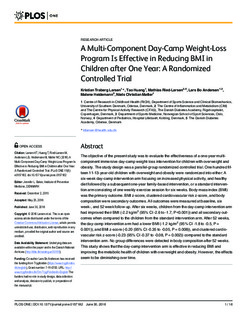A Multi-Component Day-Camp Weight-Loss Program Is Effective in Reducing BMI in Children after One Year: A Randomized Controlled Trial
Larsen, Kristian Traberg; Huang, Tao; Ried-Larsen, Mathias; Andersen, Lars Bo; Heidemann, Malene; Møller, Niels Christian
Journal article, Peer reviewed
Permanent lenke
http://hdl.handle.net/11250/2433096Utgivelsesdato
2016-06-30Metadata
Vis full innførselSamlinger
- Artikler / Articles [2096]
Sammendrag
The objective of the present study was to evaluate the effectiveness of a one-year multi-component immersive day-camp weight-loss intervention for children with overweight and obesity. The study design was a parallel-group randomized controlled trial. One hundred fifteen 11-13-year-old children with overweight and obesity were randomized into either: A six-week day-camp intervention arm focusing on increased physical activity, and healthy diet followed by a subsequent one-year family-based intervention, or a standard intervention arm consisting of one weekly exercise session for six weeks. Body mass index (BMI) was the primary outcome. BMI z-score, clustered cardiovascular risk z-score, and body composition were secondary outcomes. All outcomes were measured at baseline, six week-, and 52 week follow-up. After six weeks, children from the day-camp intervention arm had improved their BMI (-2.2 kg/m2 (95% CI -2.6 to -1.7, P<0.001)) and all secondary outcomes when compared to the children from the standard intervention arm. After 52 weeks, the day-camp intervention arm had a lower BMI (-1.2 kg/m2 (95% CI -1.8 to -0.5, P = 0.001)), and BMI z-score (-0.20 (95% CI -0.35 to -0.05, P = 0.008)), and clustered cardiovascular risk z-score (-0.23 (95% CI -0.37 to -0.08, P = 0.002)) compared to the standard intervention arm. No group differences were detected in body composition after 52 weeks. This study shows that the day-camp intervention arm is effective in reducing BMI and improving the metabolic health of children with overweight and obesity. However, the effects seem to be diminishing over time.
